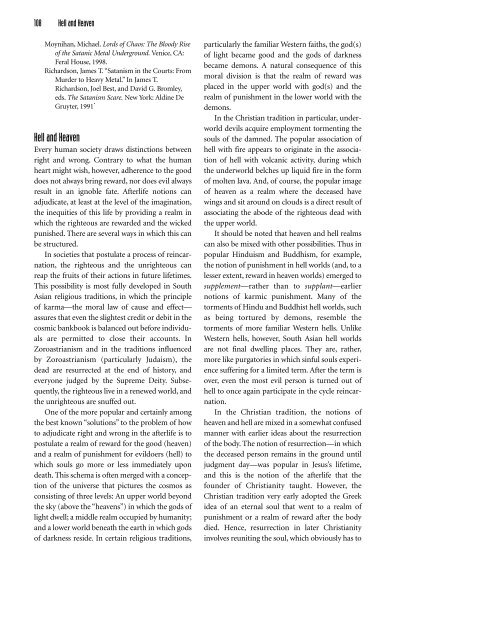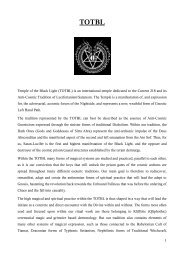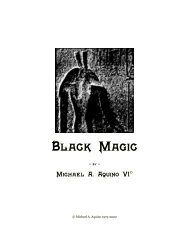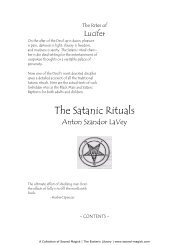Satanism Today - An Encyclopedia of Religion, Folklore and Popular ...
Satanism Today - An Encyclopedia of Religion, Folklore and Popular ...
Satanism Today - An Encyclopedia of Religion, Folklore and Popular ...
You also want an ePaper? Increase the reach of your titles
YUMPU automatically turns print PDFs into web optimized ePapers that Google loves.
108 Hell <strong>and</strong> Heaven<br />
Moynihan, Michael. Lords <strong>of</strong> Chaos: The Bloody Rise<br />
<strong>of</strong> the Satanic Metal Underground. Venice, CA:<br />
Feral House, 1998.<br />
Richardson, James T. “<strong>Satanism</strong> in the Courts: From<br />
Murder to Heavy Metal.” In James T.<br />
Richardson, Joel Best, <strong>and</strong> David G. Bromley,<br />
eds. The <strong>Satanism</strong> Scare. New York: Aldine De<br />
Gruyter, 1991 .<br />
Hell <strong>and</strong> Heaven<br />
Every human society draws distinctions between<br />
right <strong>and</strong> wrong. Contrary to what the human<br />
heart might wish, however, adherence to the good<br />
does not always bring reward, nor does evil always<br />
result in an ignoble fate. Afterlife notions can<br />
adjudicate, at least at the level <strong>of</strong> the imagination,<br />
the inequities <strong>of</strong> this life by providing a realm in<br />
which the righteous are rewarded <strong>and</strong> the wicked<br />
punished. There are several ways in which this can<br />
be structured.<br />
In societies that postulate a process <strong>of</strong> reincarnation,<br />
the righteous <strong>and</strong> the unrighteous can<br />
reap the fruits <strong>of</strong> their actions in future lifetimes.<br />
This possibility is most fully developed in South<br />
Asian religious traditions, in which the principle<br />
<strong>of</strong> karma—the moral law <strong>of</strong> cause <strong>and</strong> effect—<br />
assures that even the slightest credit or debit in the<br />
cosmic bankbook is balanced out before individuals<br />
are permitted to close their accounts. In<br />
Zoroastrianism <strong>and</strong> in the traditions influenced<br />
by Zoroastrianism (particularly Judaism), the<br />
dead are resurrected at the end <strong>of</strong> history, <strong>and</strong><br />
everyone judged by the Supreme Deity. Subsequently,<br />
the righteous live in a renewed world, <strong>and</strong><br />
the unrighteous are snuffed out.<br />
One <strong>of</strong> the more popular <strong>and</strong> certainly among<br />
the best known “solutions” to the problem <strong>of</strong> how<br />
to adjudicate right <strong>and</strong> wrong in the afterlife is to<br />
postulate a realm <strong>of</strong> reward for the good (heaven)<br />
<strong>and</strong> a realm <strong>of</strong> punishment for evildoers (hell) to<br />
which souls go more or less immediately upon<br />
death. This schema is <strong>of</strong>ten merged with a conception<br />
<strong>of</strong> the universe that pictures the cosmos as<br />
consisting <strong>of</strong> three levels: <strong>An</strong> upper world beyond<br />
the sky (above the “heavens”) in which the gods <strong>of</strong><br />
light dwell; a middle realm occupied by humanity;<br />
<strong>and</strong> a lower world beneath the earth in which gods<br />
<strong>of</strong> darkness reside. In certain religious traditions,<br />
particularly the familiar Western faiths, the god(s)<br />
<strong>of</strong> light became good <strong>and</strong> the gods <strong>of</strong> darkness<br />
became demons. A natural consequence <strong>of</strong> this<br />
moral division is that the realm <strong>of</strong> reward was<br />
placed in the upper world with god(s) <strong>and</strong> the<br />
realm <strong>of</strong> punishment in the lower world with the<br />
demons.<br />
In the Christian tradition in particular, underworld<br />
devils acquire employment tormenting the<br />
souls <strong>of</strong> the damned. The popular association <strong>of</strong><br />
hell with fire appears to originate in the association<br />
<strong>of</strong> hell with volcanic activity, during which<br />
the underworld belches up liquid fire in the form<br />
<strong>of</strong> molten lava. <strong>An</strong>d, <strong>of</strong> course, the popular image<br />
<strong>of</strong> heaven as a realm where the deceased have<br />
wings <strong>and</strong> sit around on clouds is a direct result <strong>of</strong><br />
associating the abode <strong>of</strong> the righteous dead with<br />
the upper world.<br />
It should be noted that heaven <strong>and</strong> hell realms<br />
can also be mixed with other possibilities. Thus in<br />
popular Hinduism <strong>and</strong> Buddhism, for example,<br />
the notion <strong>of</strong> punishment in hell worlds (<strong>and</strong>, to a<br />
lesser extent, reward in heaven worlds) emerged to<br />
supplement—rather than to supplant—earlier<br />
notions <strong>of</strong> karmic punishment. Many <strong>of</strong> the<br />
torments <strong>of</strong> Hindu <strong>and</strong> Buddhist hell worlds, such<br />
as being tortured by demons, resemble the<br />
torments <strong>of</strong> more familiar Western hells. Unlike<br />
Western hells, however, South Asian hell worlds<br />
are not final dwelling places. They are, rather,<br />
more like purgatories in which sinful souls experience<br />
suffering for a limited term. After the term is<br />
over, even the most evil person is turned out <strong>of</strong><br />
hell to once again participate in the cycle reincarnation.<br />
In the Christian tradition, the notions <strong>of</strong><br />
heaven <strong>and</strong> hell are mixed in a somewhat confused<br />
manner with earlier ideas about the resurrection<br />
<strong>of</strong> the body. The notion <strong>of</strong> resurrection—in which<br />
the deceased person remains in the ground until<br />
judgment day—was popular in Jesus’s lifetime,<br />
<strong>and</strong> this is the notion <strong>of</strong> the afterlife that the<br />
founder <strong>of</strong> Christianity taught. However, the<br />
Christian tradition very early adopted the Greek<br />
idea <strong>of</strong> an eternal soul that went to a realm <strong>of</strong><br />
punishment or a realm <strong>of</strong> reward after the body<br />
died. Hence, resurrection in later Christianity<br />
involves reuniting the soul, which obviously has to
















